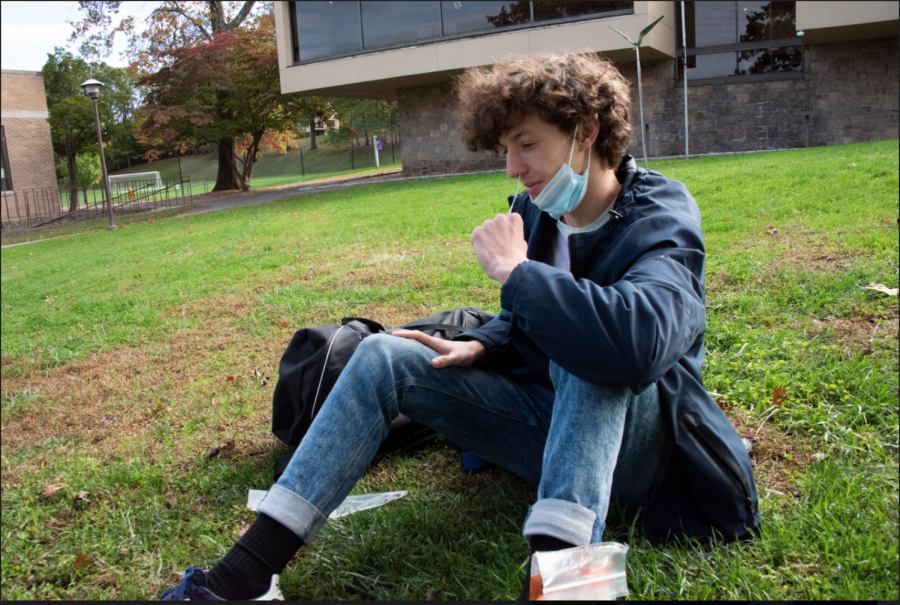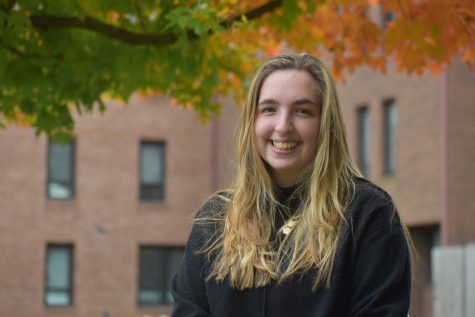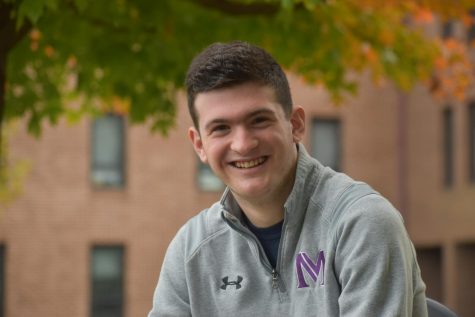Masters announces pooled testing plan, results come back negative
Junior Finn Alexander tests himself for Covid-19 with a nasal swab. His sample was part of the pooled testing regimen the school has been using.
October 31, 2020
Wednesday, Oct. 28––Weekly pooled testing began this week after Director of Health Services Sue Adams announced that Masters would be shifting its Covid-19 testing approach from an initial single round to a pooled testing regimen in a community-wide email sent on Friday Oct. 16.
The school collected its first samples on Monday Oct. 26. The testing is being carried out in coordination with JCM Analytics, a health consulting firm based in Durham, N.C.
Pooled testing involves the collection of individual testing samples, which are then grouped together in “pools” and analyzed for traces of Covid-19. It has become increasingly popular across the nation, due to its capability to test large groups of people accurately.
In areas which are not suffering from a major spike in cases, the method works well, because a majority of the pools will come back negative. However, when a significant number of pools test positive, each individual sample must be retested, which can result in a waste of key resources.
Every student and faculty member received a testing kit, which consisted of a nasal swab and a plastic vial, which they used to gather their own samples while at home. Individuals who were not cleared by the AUXS Safety App were not allowed to participate in the testing. The AUXS Safety App is a tool which the school has used to keep potentially symptomatic individuals off campus.
“The health advisory team felt [pooled testing] was needed to pursue the most accurate picture possible of asymptomatic occurrences,” Adams told Tower.
Masters shifted to pool testing after completing an initial round of testing, where students and faculty were each individually tested on campus before the campus reopened for hybrid live and remote classes on October 5. No positive tests came back from that initial round of pre-campus testing.
Many students and faculty have reacted positively to the news, citing the frequency and convenience of the program.
Senior Brooke Tatarian said, “I think it’s more effective, in comparison to having everyone come into school to test individually,” adding, “You’d rather be safe than sorry.”
Jonathan Karpinos, chair of the Modern and Classical Languages Department and Upper School Latin teacher, echoed Tatarian’s sentiment.
“It feels like a manageable way to keep the testing going,” he said.
Head of School Laura Danforth and other top administrators worked closely with the health advisory team to make the decision, weighing the convenience, cost and effectiveness.
“We have about 1,000 people coming and going on our campus every day and if you do individual testing, it’s a lot more expensive, like 55 dollars a test. With pool testing you still get a great sampling of how we’re doing healthwise on our campus.”
Both Danforth and Adams expressed that the shift came after researching the testing methods of other schools in the area. Among the schools researched were Rye Country Day in Rye, N.Y, The Hill School in Pottstown, Pa. and Hackley School in Tarrytown, N.Y.
Hackley has employed a pooled testing system since it opened in early September, and according to Peter Sawkins, the school’s director of auxiliary services, the program has been successful. Hackley has reported zero cases of the virus.
Upper School History Teacher Andrew Lopez was pleased with the shift, not just because of the accuracy of pooled testing, but also because it forces the students to take on social responsibility.
“It is a weekly reminder for the students to take their behavior seriously as it relates to preventative measures,” he said. He added, “You don’t want to be the one kid to fail the pool test, and so maybe you make the decision that ‘I’m not going to go out tonight’ or ‘I’m not going to engage in risky behavior’.”
Saturday, Oct. 31––All samples from the school’s first round of pooled testing came back negative, as relayed in a community-wide email communication from Danforth.
“This encouraging news is a reassuring reminder that our safety protocols are working, and we must not lower our guard.”





